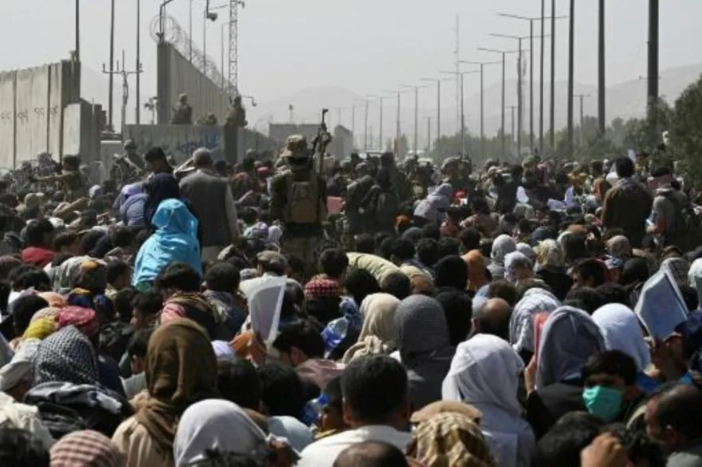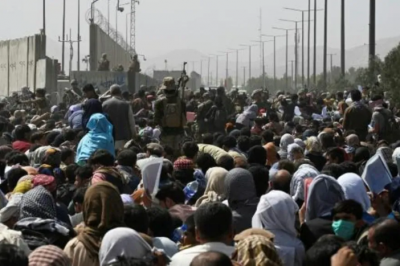In front of the airport, American and French soldiers sort arriving people, shouting "He is with us, she is not...". Those who pass can flee Kabul, as Muhammad mentioned. Meanwhile, others who attempted to infiltrate the group supported by the French embassy were pushed away.
After arriving in Paris alongside hundreds of Afghans evacuated by air forces, Muhammad and dozens of his compatriots narrate to AFP the exhausting details of their journey, the escape process, and their feelings of fear and relief, but also sadness. Maryam, deeply saddened by being separated from one of her three children during the journey, recounted, "I tried several times to enter the embassy, but Taliban gunmen prevented me. One of them hit me with a Kalashnikov. I was crying in the street when someone from the French side saw me and then opened the door for us."
Under pseudonyms for fear of revenge on their loved ones, they describe the urgency, beatings, insults, and the desperate escape from the Afghan capital, the chaos around the airport, and the relief upon reaching Europe, mixed with great sadness for leaving their country and some family members behind.
Jibran had to leave everything in an instant, and that’s exactly what he did. He said that simply working as a driver for a foreign company made him a target in the eyes of the Taliban. The young man in his forties recounted, "I left Afghanistan with just my clothes and my family. I went straight from the office to my home. I shut the door and then we left" for the embassy. In his pockets, seven passports, his wife’s passport, and those of their five children, along with 2000 Afghanis or less than 20 euros. At a hotel near Paris where they were all housed, he stated, "We are starting a new life but from scratch," expressing that despite everything, "I am happy to have survived the horrors of the Taliban."
"Taliban everywhere"
However, reaching the embassy came with significant dangers, as Abdullah (32), a foreign media correspondent holding a visa along with his pregnant wife in her eighth month, described. The couple set off on their journey. "Taliban gunmen were everywhere. They searched every car and every bag." Between his home and the Green Zone, where the French embassy was located, rebels had set up three checkpoints. He added, "It was terrifying. I thought they would stop me. The leaders asked me, 'Why are you going to France?'" Ultimately, they were allowed to pass.
At just 20 years old and alone, he had to leave his parents behind after they were beaten by Taliban gunmen. This employee at the French embassy stated he was "beaten" by rebels while on his way there on Monday, explaining, "They told me, 'Stop working for foreigners, or we will consider you an infidel and kill you.'"
Although he was permitted to enter the embassy, he saw outside Taliban gunmen beating his father, who was trying to join him with his wife. He continued, "He and my mother had to go back home." Massoud managed to reunite with his wife and their four children. This photojournalist from Jalalabad, the capital of eastern Afghanistan, had covered attacks by the Taliban and ISIS, putting his life at risk. He was in Kabul when the Taliban took the city. His family took a car and managed to cover the three-hour distance to join him and enter the embassy. They did not even have extra diapers for their two-and-a-half-month-old baby.
- Five kilometers in three hours -
Then they were all transported to the airport at night under the escort of French forces. Behind the windows, the faces of those remaining show fear while armed men are surveilling everywhere. The head of "Red," an elite unit of the French police, indicated that "five kilometers" between the embassy and the airport seems "very long" despite previous "negotiations" between the French and the Taliban.
Five kilometers took two and a half to three hours, slower than walking because the rebels repeatedly stopped the convoy. Massoud said, "I was very worried. I was afraid of being attacked. There was a lot of tension among the passengers." The Pakistani journalist who was evacuated with them, Shahzeb, faced death in the eyes. As a crowd gathered near the bus he was being transported in, some tried to break into it, prompting a Taliban member to fire shots into the air to disperse the crowd before allowing the bus to leave.
The same scenes repeated in front of the airport where thousands of desperate Afghans gathered. However, this time it was American soldiers firing into the air, as Muhammad, a technician working for a foreign company with French visas for his wife and their six children, recounted. He added, "When we got off the bus, some mixed in with us hoping to enter" the compound surrounded by Taliban gunmen. He continued, "Thus, the French started telling the Americans (guarding the entrance) while pointing out people, 'She is with us, he is with us, she is not with us...'"
Muhammad explained, "As soon as we arrived at the airport, we felt safe." But this feeling of safety does not erase the anxiety and fear that accompanied the move to the airport. Maryam, with two of her three children, began searching again for her third child, who was supposed to enter the embassy with her aunt earlier, but without success. She said her husband, a senior official in the Afghan administration, refused to accompany them for fear "that the rebels would kill them in the street."
"I had no choice"
The French military plane took off and then arrived at Air Base 104 of the UAE Air Force. They then transferred to a larger plane for a seven-hour flight to Paris to start a new life. However, sorrow and guilt accompany most of them.
Omar trembles with fear for his parents, who he says are in great danger because of the mistake he made. He added, "Taliban gunmen came to us and said, 'If you don’t hand over your son, we will kill you.'" Muhammad, feeling regret for having "abandoned" his father and brother and sister, said, "I had no other choice!" adding, "In 1996 when the Taliban came to power, they imprisoned me. I don’t want that to happen to my children."
Maryam breathes a little easier. Her husband took their son to Mazar-i-Sharif, a large city in the north bordering Uzbekistan, as he had a visa for that country. She relayed, "They are on their way to Tashkent, the Uzbek capital... but when will I see them again?"




